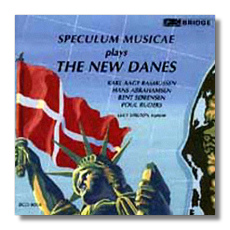
The Internet's Premier Classical Music Source
Related Links
- Ruders Reviews
- Latest Reviews
- More Reviews
-
By Composer
-
Collections
DVD & Blu-ray
Books
Concert Reviews
Articles/Interviews
Software
Audio
Search Amazon
Recommended Links
Site News
 CD Review
CD Review
Speculum Musicae plays the New Danes

- Karl Aage Rasmussen: Movements on a Moving Line 1
- Bent Sorensen: The Deserted Churchyards 2
- Hans Abrahamsen: Winternacht 3
- Poul Ruders: The Bells 4
4 Lucy Shelton, soprano
1 Speculum Musicae/Donald Palma
2,4 Speculum Musicae/David Starobin
3 Speculum Musicae/William Purvis
Bridge Records BCD9054 DDD 56:30
Denmark has the reputation for being a sleepy little country filled with quaint things (Tivoli Gardens, mementos of Hans Christian Andersen) and a liberal attitude towards sexuality. Like several other northern European countries, however, Denmark is furiously engaged in cutting-edge musical activity. Several months ago I wrote about the exciting, confrontational compositions of Poul Ruders. This disc presents a relatively recent work by Ruders, and works by three of his Danish contemporaries: Karl Aage Rasmussen, Bent Sorensen, and Hans Abrahamsen.
Ruders is not the first composer to do a setting of Edgar Allen Poe's "The Bells," of course. It should be noted that Rachmaninoff's vocal symphony takes about forty minutes, requires a chorus and two soloists, and makes a far less Poe-like impression than Ruders' eighteen-minute setting does in spite of all that bulk. That's not to say that Rachmaninoff's The Bells isn't a fine work; it just has a lot less Poe in it than Ruders's. The Dane transcribes the poem's jangling rhythms almost exactly, and the vocal line mirrors its emotional content to the point where your nerves might be set on edge by the brazen alarum bells. Ruders reserves his most powerful dramatic coup for last: the tolling of iron funeral bells is depicted by repeated, stentorian notes on low piano strings with mutes. Lucy Shelton executes her merciless solo line with flamboyance, but she must have been hoarse for a week after all that (appropriate) shrieking and moaning was over.
The other works also make a positive impression. To understand what is happening in Rasmussen's Movements on a Moving Line, first think of a globe covered with continents and oceans, each with its own unique musical material. Then, draw a two-dimensional plane down through the globe such that the plane and the globe intersect as a circle. Next, imagine yourself as a point travelling along that circle's circumference, passing through the different musical continents and oceans. Got it? Now, as you are travelling along that circumference, someone keeps moving the plane up and down and tilting it different ways so each one of your revolutions takes you through a slightly different cut of the oceans and continents. That's the idea behind Rasmussen's piece, which simultaneously sounds like Stravinsky's Dumbarton Oaks and Ligeti at his twitchiest. Sorensen's The Deserted Churchyards is suffused with a pulsating light. Sing-songy phrases jingle along in the stratosphere, swoop like barn swallows, and rise again with kaleidoscopic changes in instrumentation. Bells toll in this work too, but their emotional import is more equivocal here than in the Ruders. Finally, Winternacht by Abrahamsen is in four brief movements. The composer's inspiration is an etching by M.C. Escher, poems by Georg Trakl, and the music of Igor Stravinsky. These movements are haunting, atmospheric miniatures that bind together to form a totality that's more than the sum of its parts.
Speculum Musicae is dedicated to presenting the works of today's composers. Their previous Bridge releases have been devoted to music by George Crumb, Elliott Carter, Stephen Jaffe, and others. They play with such interpretive strength that you may forget that you're not supposed to like modern classical music! Twin bright spots in a field of gray, Bridge Records and Speculum Musicae have made today's music a central reason for their existence. Thoughtfully packaged for both the convinced and the skeptical, "The New Danes" is another success for both of them.
Copyright © 1996, Ray Tuttle




















